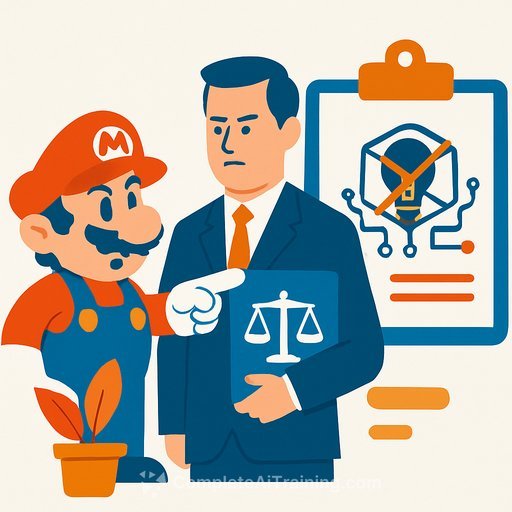Nintendo denies lobbying Japan's government on generative AI
Nintendo has publicly denied claims that it lobbied Japan's government on the use of generative AI. The company said it has had no contact with government offices on this topic and reiterated its stance on protecting intellectual property.
These rumors surfaced as generative AI content spreads across entertainment, including games. Some critics label low-effort outputs as "AI slop," raising quality and IP concerns that quickly land on a policymaker's desk.
What Nintendo said
In a post on X/Twitter, Nintendo stated: "Contrary to recent discussions on the internet, Nintendo has not had any contact with the Japanese government about generative AI. Whether generative AI is involved or not, we will continue to take necessary actions against infringement of our intellectual property rights."
Translation: no lobbying, but a firm line on IP enforcement-regardless of whether content is AI-generated or not.
Where the rumor came from
A translated post on X/Twitter by politician Asano Satoshi, since deleted, claimed Nintendo was "advancing lobbying efforts with the government" while avoiding generative AI to protect its IP. That claim moved fast online before being challenged by Nintendo's statement.
For officials, this is a reminder: social posts can become "evidence" in hours. Verification must be immediate and documented.
Why this matters for government staff
- Signal vs. noise: High-profile companies will be linked to AI policy moves-some accurate, some not. Your job is to validate the source, timing, and channel.
- IP enforcement pressure: Even without lobbying, industry expects clear rules on AI-derived works, training data, and infringement.
- Public trust: Misreported influence can undermine confidence in fair process. Transparent records of engagement protect both sides.
Practical steps for agencies
- Stand up a verification protocol for claims of industry contact: confirm with official channels, log inquiries, and publish brief clarifications when warranted.
- Maintain an engagement register: who met whom, when, and on what topic. Update proactively to limit speculation.
- Coordinate with IP and competition authorities on AI-generated content policy, including enforcement triggers and appeals.
- Update procurement rules to address AI-generated assets in bids, disclosures on model use, and indemnities for IP risk.
- Create a rapid-response template for social media narratives that cite government involvement without evidence.
Policy signals to watch
- Clearer definitions for AI-generated versus human-authored content in enforcement contexts.
- Disclosure standards for training data sources and model-assisted production in creative submissions.
- Cross-border alignment on IP and AI to reduce forum-shopping and gaps in protection.
Resources
- WIPO: Artificial Intelligence and Intellectual Property
- Complete AI Training: Courses by Job - useful for teams building AI literacy before drafting or enforcing policy.
Your membership also unlocks:






